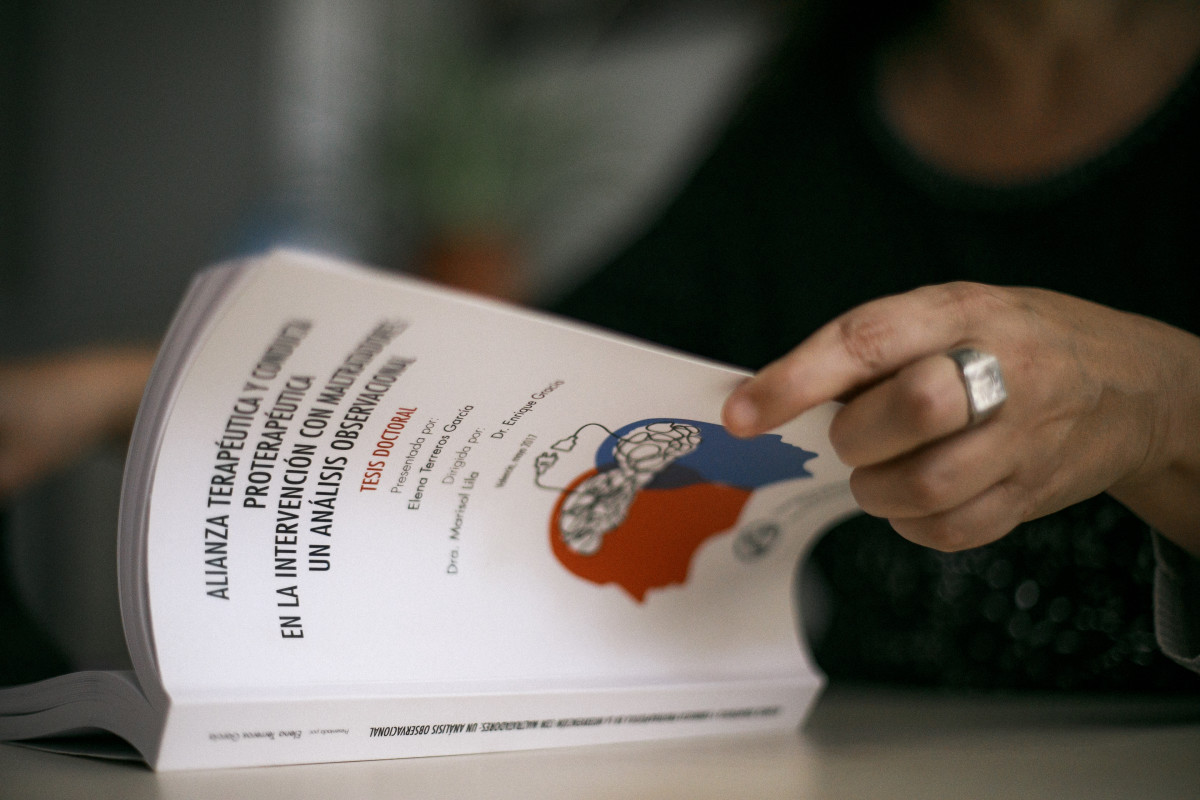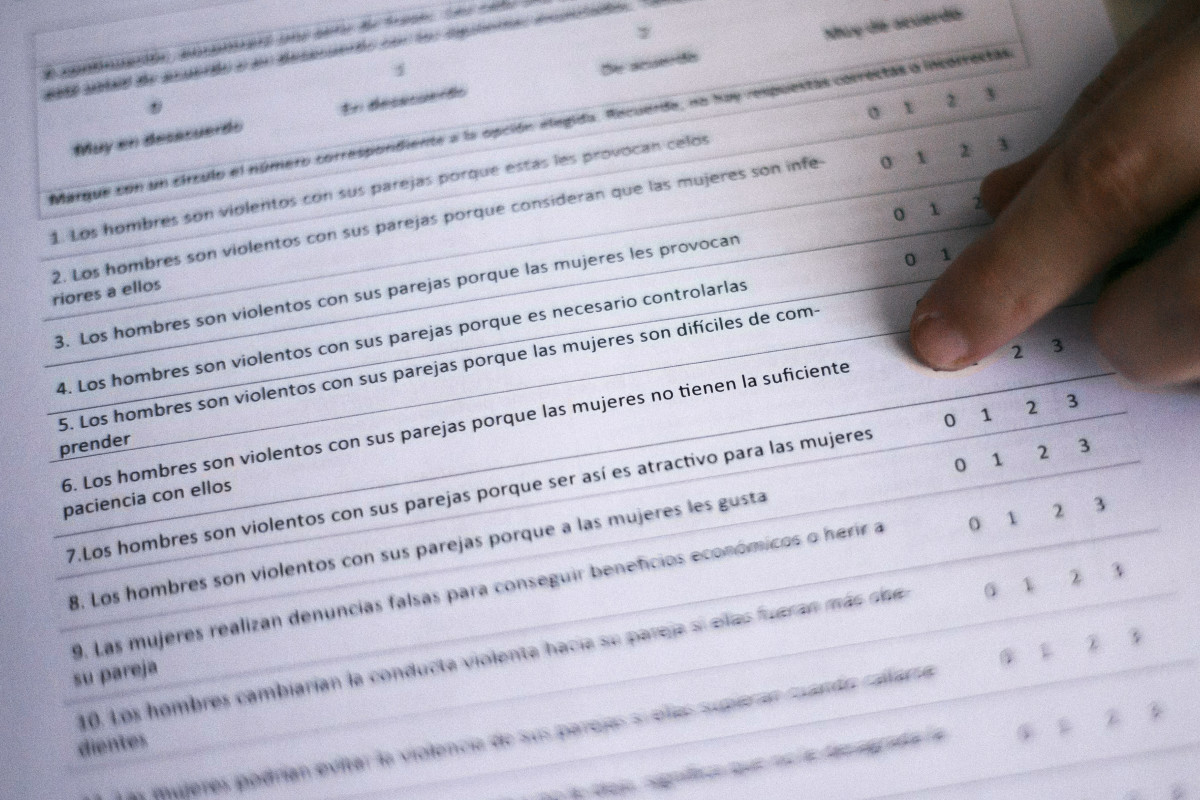Research
Our priority is to carry out intervention based on scientific evidence. To this end, Contexto has a research team belonging to different Departments of the Faculty of Psychology and Speech Therapy of the University of Valencia. We use advanced and innovative research methods in the field of intimate partner violence against women and intervention with aggressors.
Research in Contexto
Are intervention programmes with men who are violent in their intimate partner relationships effective, and what elements influence the reduction of violent behaviour? The Contexto Programme is committed to seeking answers to these and other questions through rigorous research methods.
In the Contexto Programme we are aware of the importance of ensuring that intervention with men who perpetrate intimate partner violence against women is based on the available scientific evidence, is effective and contributes to women's safety; as well as offering effective tools to these perpetrators so that they can establish positive relationships free of violence.
Therefore, one of our commitments is to advance the available knowledge about what works and what does not work in intervention with men who perpetrate intimate partner violence. Thus, we aim to prevent violence through validated strategies based on rigorous research methods. Based on national and international scientific literature, we are developing several lines of research to test the effectiveness of our programme and to include the most innovative strategies, as well as to offer society and the scientific community advances in the field of intervention with perpetrators.


There are many challenges and questions we would like to answer; are intervention programmes with men intimate partner violence perpetrators effective, do they really reduce the likelihood of subsequent acts of aggression against women, are some intervention methods or strategies more effective than others? If they are effective, what are the elements that bring about change, are specific intervention programmes needed for different types of offenders, do programmes need to be culturally sensitive, do intervention programmes need to specifically address the main risk factors, what influence does the intervention group have on participants' change? In order to answer these questions in a rigorous way, the team has initiated different lines of research and publishes the results obtained in scientific journals.
Research team
Marisol Lila
FULL PROFESSOR OF SOCIAL PSYCHOLOGY OF THE UNIVERSITAT DE VALÈNCIA
She has ample experience in the intimate partner violence against women area, and has conducted research that have specifically focused on the study and intervention with men sentenced for intimate partner violence against women. Today her work centres on the study of the psycho-social factors involved in intimate partner violence against women, and the evaluation and improvement of the effectiveness of intervention programmes with perpetrators. Professor Lila has published a large number of scientific articles in international reference journals. She has participated and been the Principal Investigator of many research projects. She is currently the Associate Editor of the Psychosocial Intervention journal.
Enrique Gracia
FULL PROFESSOR OF SOCIAL PSYCHOLOGY OF THE UNIVERSITAT DE VALÈNCIA
He heads the VIO-Strategy (advanced research strategies in family violence and intimate partner violence against women) research group at the Universitat de València. Nowadays, partner violence against women is a main theme of his research activities. The analysis of social perceptions and attitudes towards intimate partner violence against women, the acceptability of such violence, public attitudes towards intervention in cases of intimate partner violence against women, victim-blaming attitudes and the spatial epidemiology of intimate partner violence against women occupy an outstanding place in this area. Professor Gracia has published a large number of scientific articles in international reference journals. He is also the author of many books and book chapters. He has participated and been the Principal Investigator of many research projects. He is presently the Editor-in-Chief of the Psychosocial Intervention journal.
Luis Moya Albiol
FULL PROFESSOR OF PSYCHOBIOLOGY AT THE UNIVERSITAT DE VALÈNCIA
He heads the ‘Social Neuroscience’ research group, which focuses on not only the study of social stress and violence, but also on cooperation, neurohappiness and empathy. He presently conducts research works about the psycho-physiological and neurophysiological profile of men sentenced for violence against women in men-women partner relationships in close collaboration with Prof. Marisol Lila. These are pioneering studies on the theme because they add a neuroscientific vision to the research works conducted from epidemiology, social psychology, clinical psychology, among other knowledge areas. He has published many books and works in scientific journals, and led several research projects and doctoral theses.
Ángel Romero Martínez
ASSOCIATE PROFESSOR OF PSYCHOBIOLOGY, UNIVERSITAT DE VALÈNCIA
He is a doctor in neurosciences by the Universitat de València and associate professor of Psychobiology at the same university. He forms part of the Social Neuroscience team, whose research activity corresponds to the Department of Psychobiology at the Faculty of Psychology and Speech Therapy. His professional career focuses on investigating human behaviour from a psychobiological perspective by mainly studying the way in which neuropsychological, hormonal and psychophysiological variables underlie perpetrating violence and the recidivism risk of men sentenced for violence against women while in men-women partner relationships. He has published his work in national and international journals, and has written book chapters. He has also combined these tasks with the management and co-management of doctoral theses (master’s and other degrees) and with performing management tasks.
Raquel Conchell
CONTRACTED PhD PROFESSOR AT THE FACULTY OF PHILOSOPHY AND EDUCATIONAL SCIENCES AT THE UNIVERSITAT DE VALÈNCIA
As a Doctor in Psychology, she presently investigates intimate partner violence against women by showing an interest in social attitudes towards this form of violence and in interventions with perpetrators. She has collaborated in different R&D projects, participated in national and international scientific congresses, and disseminated research during talks and in scientific articles.
Viviana Vargas
DOCTOR IN PSYCHOLOGY, UNIVERSITAT DE VALÈNCIA
She is a VIO-Strategy research team member. She has focused her studies on the social processes involved in violence in families. Her research interest has centred on the relation between immigration and violence against partners.
Elena Terreros García
DOCTOR IN PSYCHOLOGY, UNIVERSITAT DE VALÈNCIA
She has ample experience in intervention with men who exercise or have exercised intimate partner violence against women. Her research interest lies in improving the effectiveness of intervention programmes with this population. She is particularly interested in the design and evaluation of tools that encourage motivating a change of violent attitudes and behaviours.
Faraj A. Santirso
ASSISTANT PhD PROFESSOR OF SOCIAL PSYCHOLOGY AT THE UNIVERSITAT DE VALÈNCIA
He is a VIO-Strategy research team member. He focuses on studying the efficiency of motivational strategies in interventions with men sentenced for intimate partner violence against women, and the observational evaluation of indicators regarding the efficiency of intervention like a therapeutic alliance and protherapeutic behaviour. He has participated in different research projects and has shared his findings in reference international scientific journals and in congresses in Spain and abroad.
Manuel Martín-Fernández
ASSISTANT PhD PROFESSOR OF SOCIAL PSYCHOLOGY AT THE UNIVERSITAT DE VALÈNCIA
He is a VIO-Strategy research team member. His studies centre on the social processes involved in violence in families. He is an expert in the methodology of behavioural sciences and Bayesian statistics. He presently investigates intercultural evaluations and the statistical modelling of attitudes towards intimate partner violence against women.
Manuel Roldán-Pardo
PhD STUDENT IN SOCIAL PSYCHOLOGY AT THE UNIVERSITAT DE VALÈNCIA
He is a VIO-Strategy research team member. His studies focus on group variables and dynamics in intervention groups for perpetrators. He studies the analysis of the impact of group processes on the outcomes, functioning and effectiveness of interventions with men sentenced for intimate partner violence against women. He has experience in interventions with men who exercise or have exercised intimate partner violence against women.
Cristina Expósito- Álvarez
PhD STUDENT IN SOCIAL PSYCHOLOGY AT THE UNIVERSITAT DE VALÈNCIA
She is a VIO-Strategy research team member. Her research centres on studying the risk factors linked with substances use in the men sentenced for crimes of intimate partner violence against women who attend the intervention with perpetrators, and in the evaluation of the effectiveness of motivational strategies, such as self-determined goals or plans to change, which aim to reduce use and to prevent intimate partner violence against women in this population. She has participated in different research projects and has presented her works at national and international scientific congresses.
Javier Comes Fayos
PhD STUDENT IN NEUROSCIENCES, UNIVERSITAT DE VALÈNCIA
He is a Social Neuroscience research team member. He belongs to the Department of Psychobiology at the Universitat de València. His research area involves managing the evaluation of risk factors and protection in men sentenced for intimate partner violence against women from a biopsychosocial perspective. He has published his work in national and international scientific journals and been awarded for his research. He has also done part of his professional work in social interventions with a population of sentenced men.
Isabel Rodríguez Moreno
PhD STUDENT IN NEUROSCIENCES, UNIVERSITAT DE VALÈNCIA
She is a researcher in the Social Neuroscience field. She specialises in perpetrators sentenced for intimate partner violence against women and in biopsychosocial correlates of compassion and violent behaviour. She is a teacher of the degrees of psychology and criminology, and of different master degree studies. She has plenty of experience in fieldwork with intimate partner violence perpetrators, and has taken part in preventive actions and in interventions with sentenced men in prison.
Sara Bressanutti
PhD STUDENT IN CLINICAL PSYCHOLOGY, UNIVERSITAT DE VALÈNCIA
She specialises in family and interpersonal dynamics, and has ample experience in prevention and accompaniment in the mental health field, and also in the neuropsychological assessment of men sentenced for intimate partner violence against women. Nowadays, she performs tasks as a researcher in the Social Neuroscience area by collaborating in the study of biopsychosocial correlates of compassion in relation to violent behaviour.
Carolina Sarrate Costa
PhD STUDENT IN NEUROSCIENCES, UNIVERSITAT DE VALÈNCIA
She is a Social Neuroscience team member. From an integrated perspective, her research centres on analysing the psychological (in particular, those related to emotional regulation) and biological (by means of psychophysiological markers, ocular follow-up and neuropsychological) aspects of men sentenced for intimate partner violence against women. She also combines her research activity with teaching tasks in the Department of Psychobiology.